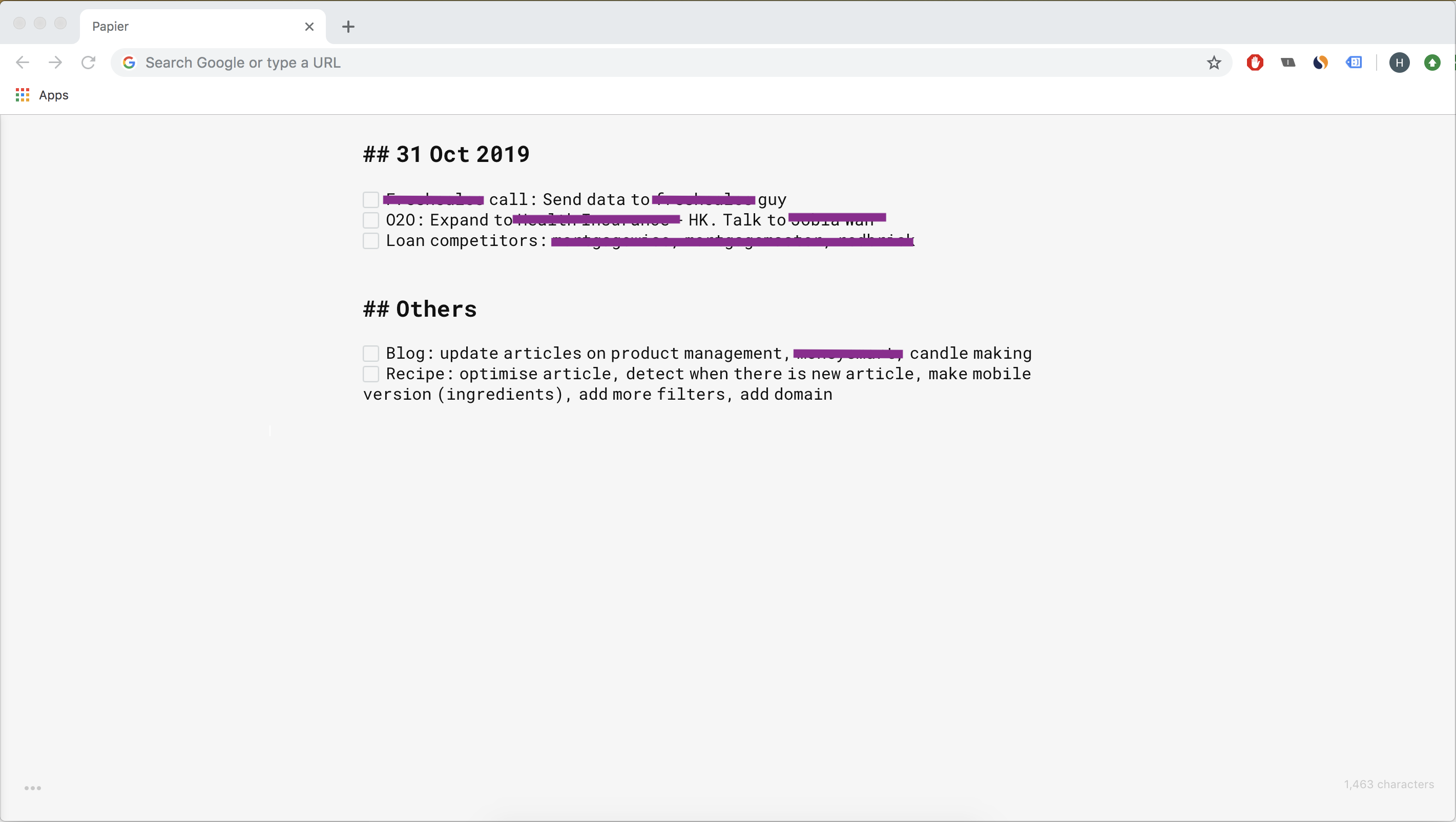How to be productive as a Product/Project Manager
My current practices to be productive
This article is about how I make myself more productive as a Product/Project Manager. Depending on team size, a product manager can act as a project manager. I’ve been in both roles for quite some time. Here, for brevity, I’ll just use PM as a general term in this article.
Observation
As a PM, I find the nature of my job is being everywhere but nowhere (or maybe in customer’s shoe as the priority). We go to meetings, we talk to business, we align, we follow up. Then half way, we realise requirements change, we talk to engineers, we align and realise it is not feasible, we align with business again. And the cycle goes on and on.
From ideation to launching a software feature, there are a lot of moving pieces. It’s common to find myself un-productive. The symptoms are:
- Forget what I’m supposed to do,
- Go to meetings all day long and realise nothing is done.
Furthermore, even if I manage to take longer time to finish what I think I’m supposed to do, I find myself
- Missing some details (like the facepalm kinda situation) and/or
- Being stuck in execution trap (instead of thinking more on product strategy).
Problems
As usual, PM would need to fall in love with problems before finding solution. By keeping asking why why why to myself, I think low productivity comes from 3 main factors, including internal and external factors.
- Internal - Short attention span: Apparently, due to the ease of browser tab switching (Ctrl+T/Command+T if anyone needs to know), I find myself building a habit of getting distracted easily. I’m aware of this issue and I even attempted to record my browser activity. See here for entertainment. Due to context switching, I end up missing what I’m supposed to do because my mind has wandered to somewhere else.
- Internal - Mental burden: As there are a lot of moving pieces in a project, it’s inevitable that my brain would have mental burden to remember everything. Unfortunately, my tasks are scattered in different places like JIRA, email or notebook.
- External/Internal - Meetings: There are 2 types of meetings that are enemies of productivity: adhoc meetings and no-agenda meetings
- Adhoc meetings: They are the party pooper. The foundation of productivity/efficiency comes from controlling what is being done at what time. An (forced or voluntary) agreement to have an adhoc meeting really simply kills that ability by stopping what I am doing to switch context to something else. But as my job requires to have a lot of alignment with stakeholders, I have made peace with certain level of adhoc meetings (unfortunately).
- No agenda meetings: It’s a waste of time, every single time, without fail. Due to lack of agenda, meetings will last longer than expected, and worse, stakeholders usually come out of those meetings with no clue on next steps. Fortunately, I had a chance to attend
goodmeetings. But the number ofno-agendameetings I experienced are still outweighed.
Solutions
The good thing is that quite a number of above points are internal factors. It’s easier to change oneself than waiting for someone to change. I don’t claim I have achieved productivity in any aspect, but I have built in myself good level of awareness. It helps alert myself as soon as I zone into the un-productivity. Below are my current practices:
1. Short attention span:
- Meditation (15 minutes) teaches me to be awareness when I’m distracted and to go back to the focus I set at the beginning. If I can focus on breathing (and nothing else) for 15 minutes, I believe I would have longer attention span when it comes to work. I’m still trying.
2. Mental burden:
- Having an aggregated place for to-dos is a must. Since my job requires me spending a lot of time in browser, I choose to have my note as the default tab background. I have been using Papier for quite sometime and am happy on how it constantly slaps at my face what I’m supposed to do.

- Having lesser tabs and browsers running at one time gives me a sense of clarity. I’m an OCD to start with so I have trouble if there are more than 5 tabs going on at anytime.
- Having lesser communications tabs/softwares appearing in laptop. I’m active in Whatsapp, Telegram, Messenger, Google Calendars (yes I think it’s a very important comms channel) and Slack. Instead of having 5 apps/tabs running, I use messaging aggregator software like Franz. I can choose which channels should show preview notification (so that I can attend to the message actively) and which one I can check message on my own later. The downside for using this kind of softwares is privacy issue as I need to log in through their platform.
3. Meetings:
- Run proper meeting: A
goodmeeting has 4 elements:
(1) Main stakeholders need to know what is the expected outcome BEFORE the meeting (e.g. to get certain decision made).
(2) Relevant stakeholders prepare for the meeting BEFORE the meeting,
(3) Organiser prepares communication methods (e.g. slides, image, call, notes taking during meeting) to facilitate the meeting (No one would want to spend additional 15 mins because of some technical issue),
(4) There are meeting summary and follow-up (if required) sent out. I don’t want to spend 1 hour in a meeting and have no clue what’s the takeaway.
- If someone is asking me for an adhoc meeting and I can’t say no (mostly boss asking for meetings), I would refer to my Papier to check if there is any important task or if there is not, note down the current state of the task before I go to meeting.